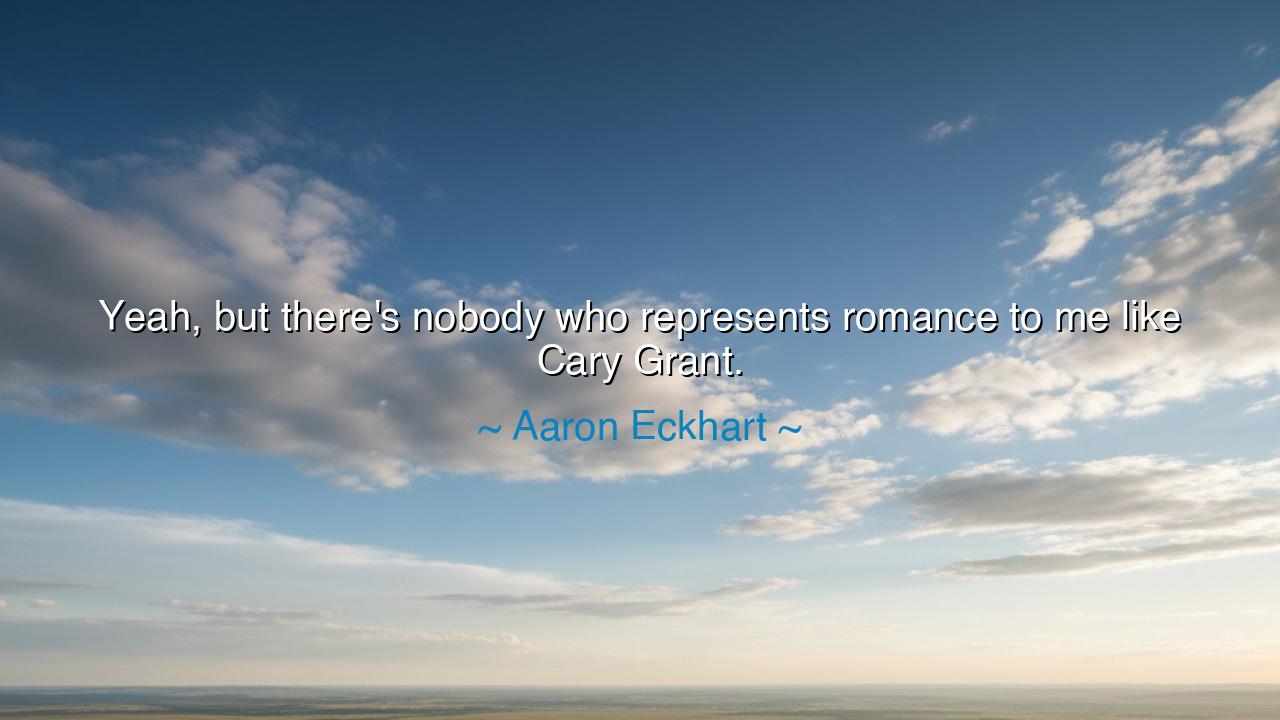
Yeah, but there's nobody who represents romance to me like Cary






The words of Aaron Eckhart rise with admiration, spoken as though he were saluting a noble figure of legend: “Yeah, but there’s nobody who represents romance to me like Cary Grant.” In this utterance, he points to Cary Grant not merely as an actor, but as the embodiment of an ideal—the image of charm, elegance, and timeless romance. Eckhart recognizes in Grant something beyond performance: a symbol of how love and desire can be clothed in wit, poise, and dignity.
To the ancients, such figures were not uncommon. They often elevated men and women into archetypes, ideals of beauty, courage, or wisdom. Grant, in the modern world, became such an archetype of romantic manhood—not through brute force or excess, but through grace, humor, and refinement. He stood as proof that romance need not be wild or unruly to be powerful. Instead, it could be noble, restrained, and yet irresistible, like the calm of a steady flame that still lights the whole room.
Cary Grant’s film career itself was a theater of this ideal. In comedies such as Bringing Up Baby and romances like An Affair to Remember, he displayed not only a handsome face, but an artistry of presence. He was playful yet dignified, lighthearted yet dependable. He embodied what Eckhart names: the very image of romance in the public imagination. His screen presence taught that love could be both thrilling and graceful, that charm could be as captivating as passion.
History is filled with figures who, like Grant, became symbols of romantic ideals. Consider Petrarch, the Renaissance poet, whose sonnets to Laura became the standard of courtly devotion. To him, Laura was more than a woman—she was the living symbol of love itself. In a similar way, Eckhart’s words place Grant not simply as a man, but as the symbol of romance incarnate for his generation. Such figures endure because they give flesh to the longings of the heart, reminding us of what we seek in love.
Yet there is also humility in Eckhart’s statement. By naming Grant as the one who “represents romance,” he acknowledges that romance itself is larger than any one person. It is an ideal that each generation cloaks in its own heroes, a vision of love that transcends time. For some it was a poet, for others a warrior, for Eckhart it is Cary Grant. The enduring truth is that humanity will always seek a face, a voice, a story through which to glimpse the mystery of love.
The lesson here is profound: in our own lives, we must recognize that romance is not only a private feeling but a vision that needs embodiment. Just as Grant embodied it on the screen, we must strive to embody it in our daily lives—not through perfection, but through presence, kindness, wit, and devotion. Love becomes real not when it is spoken of in abstraction, but when it is lived in gestures, tone, and action.
Therefore, let all who hear take action: find in your own life the qualities that make you a bearer of romance. Learn from figures like Cary Grant—not to imitate their image, but to embody their essence: grace under pressure, charm without arrogance, devotion without chains. In this way, you too may represent romance to those who walk beside you, not as a distant ideal, but as a living reality.
Thus Eckhart’s words endure as both homage and instruction: romance must have its representatives. Whether through actors, poets, or lovers themselves, we look to those who carry love with elegance and fire. Let us, then, strive to be such representatives, so that others may one day say of us: “There’s nobody who represents romance to me like them.”






AAdministratorAdministrator
Welcome, honored guests. Please leave a comment, we will respond soon